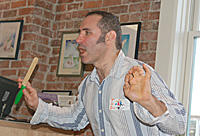By Joel Magalnick, Editor, JTNews
Keeping the attention of upward of 100 people in a crowded space can be a challenge with an audience of any age. When that audience is made up of children under the age of 5 (and their parents), that’s a different story.
But the story was why this crowd of pajama-clad Jewish kids dragged their parents to Mockingbird Books in Seattle’s Greenlake neighborhood on Sun., April 5: To hear local community member Tod Harrick tell a tale about too many cooks spoiling the Passover charoset. The event was the launch of the PJ Library (the PJ stands for pajamas, as in what the kids wear for their bedtime stories), a new program that offers a free Jewish-themed book each month to young children throughout the greater Seattle area.
“I care so much about teaching Jewish values, Torah values and things connected to the holidays,” PJ Library committee co-chair Naomi Newman, the mother of 2-year-old twin girls, told JTNews. “I felt that this would be a great way to bring people some great tools for their children, some great literature and inspiration.”
The nationwide program, which recently expanded to Seattle, is being administered by the Jewish Federation of Greater Seattle with support from several community members and local foundations, including the Newman Foundation. The Harold Grinspoon Foundation, which launched the program in 2005, is the primary sponsor and manages the book selection.
The Grinspoon Foundation has placed its bets on the PJ Library’s being a gateway to Jewish learning and continuity.
“The reason that Harold came up with this program is that [he] is so passionate about the Jewish people and how to ensure our future,” said Marcie Greenfield Simons, the PJ Library’s national director in West Springfield, Mass. “We know that the time of bringing a child into the world, either through birth or adoption, is this precious time and it’s really a window of opportunity when families are spiritually moved or emotionally moved — they’re thinking about their heritage, they’re thinking about their past and their future. So to capitalize on that moment in time can really influence Jewish choices that this family will make during the next several years.”
Simons said the program, which is in about 110 communities throughout the U.S. and will expand to Canada in May, sends out 48,000 books each month. Some areas, like Boston, have more than 4,000 families engaged in the program. Another, Hot Springs, Ariz., has nine. The Seattle area will fall in the middle, with over 350 signed up since the program was announced and funding for about 1,000.
The idea for the PJ Library came from a similar program called the Imagination Library, which was started by country music star Dolly Parton. Parton grew up in poverty in Tennessee, and when she became famous she decided to help her community by sending books to disadvantaged children. The difference, Simons said, is that where Imagination Library is a literacy program, the PJ Library is meant to instill Jewish values.
So when it comes to instilling Jewish values and continuity, does the program work? Newman thinks so.
“There was a book on peace. It talked about ‘Peace is planting trees, peace is everyone having a house, peace is eating the food that you like,’” she said. “I felt, this is such a great message of understanding the world.”
So does Lucy Pruzan, another major supporter of the local program. Her motivation, she said, was partly selfish.
“I have three grandchildren who are little and live in Jackson, Wyoming where they have very little access to Jewish books,” she said. But more than that, “I think these books will be a good introduction to young children, especially those that are not in an observant family. I think it will help bring the stories to them and enable them to learn Jewish history in an easy way.”
Simons had more concrete data: A survey done in December 2007, when the program, then only about a year old nationwide, reached a much smaller number of families, showed that 75 percent of book recipients read the stories at least once a week, while 60 percent said the book sparked conversations about Jewish topics with their children.
Simons also pointed to a pamphlet of testimonials of how holiday books led to inclusion in Passover seders and weekly challah baking.
One of the goals locally is that families whose participation in the Jewish community falls between slim and none will be drawn in by the program, and in their own homes begin some of the rituals they have learned through reading, Newman said.
Local involvement in the program came as a result of a two-year early childhood study led by the Federation aimed at figuring out what the local Jewish community has to offer young children and what it’s missing. Several programs are in the midst of being rolled out as a result of that study, with the PJ Library being the largest.
“In the next three years we will do a lot of things,” Newman said. “PJ Library’s a launching pad. It’s a great program.”
The PJ Library has been a boon to children’s book publishers as well. While no stories have been specifically commissioned by the organization, Simons said some editors looking at manuscripts will contact her to see if they might be a good fit. Also, some out-of-print titles, such as Chicken Man by Michelle Edwards and The Kugel Valley Klezmer Band by Betty Stuchner have been revived.
“We have such wonderful purchasing power when we’re ordering eight, 10, 12,000 books at a time,” Simons said, “all of a sudden [the publisher is] willing to bring it back.”
The PJ Library is free for two years to families with children ages six months to 5-1/2 years who live in King and South Snohomish Counties. Families elsewhere can join for $60 per year. Visit www.jewishinseattle.org/pjlibrary for details.
